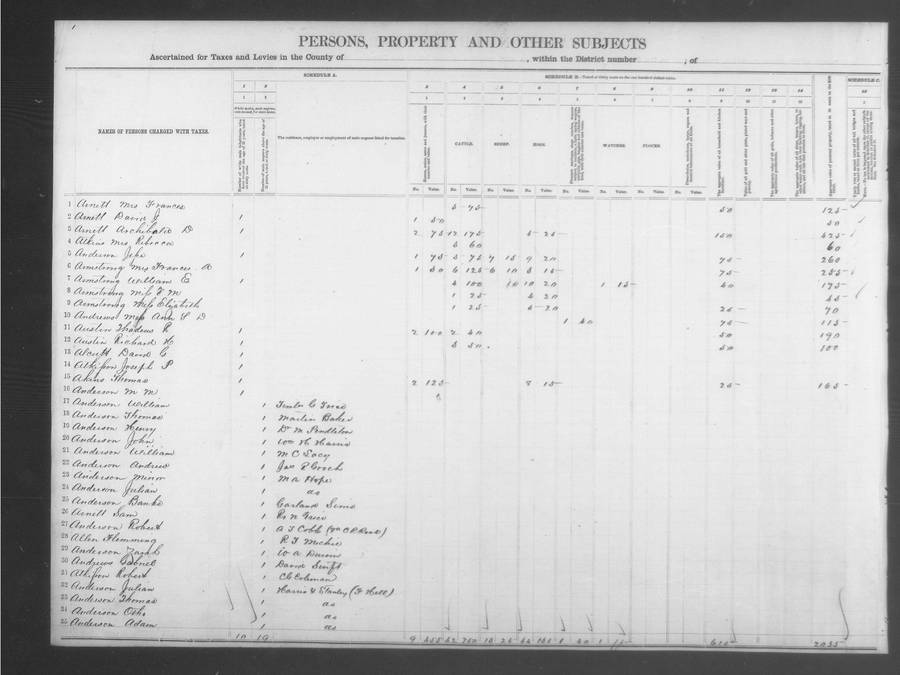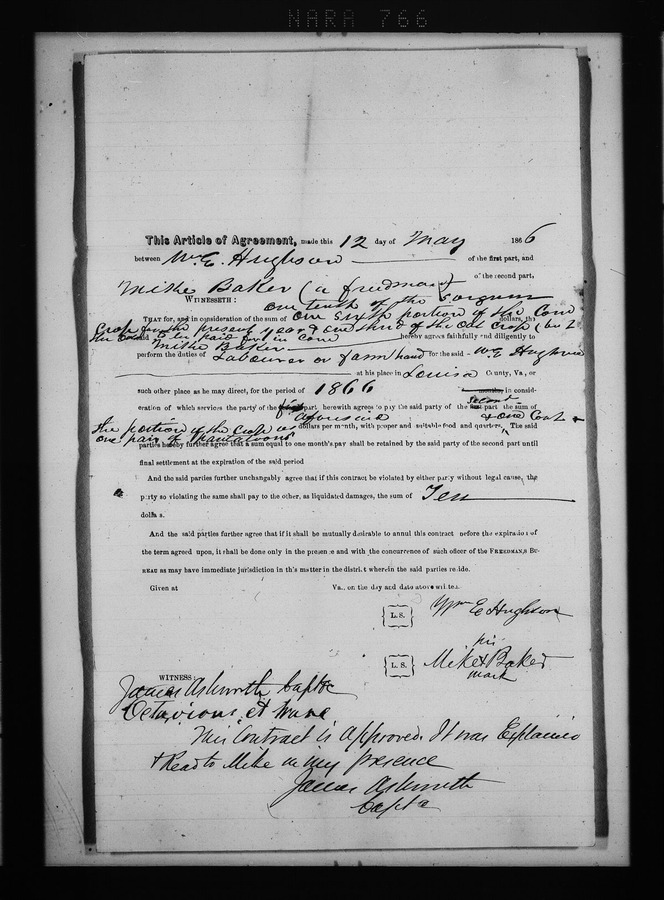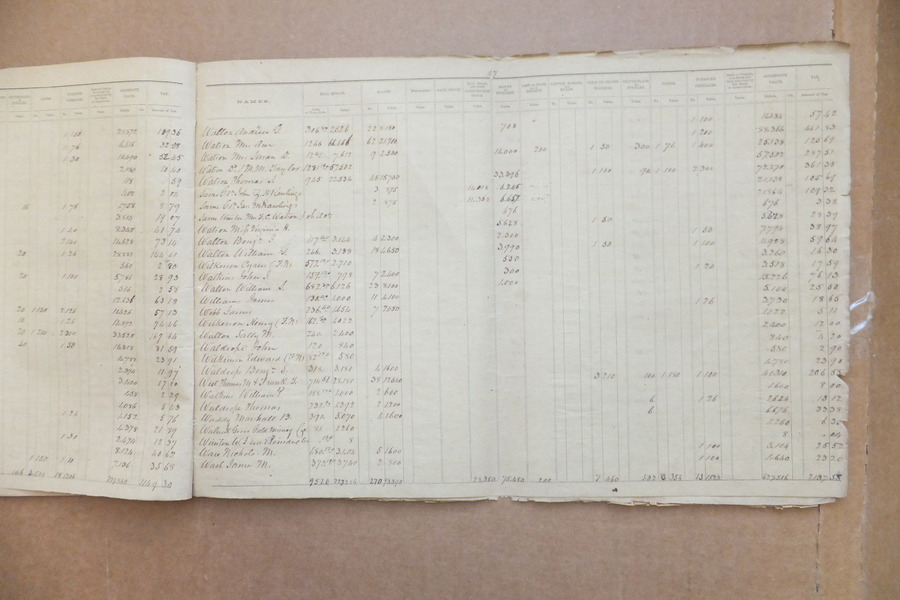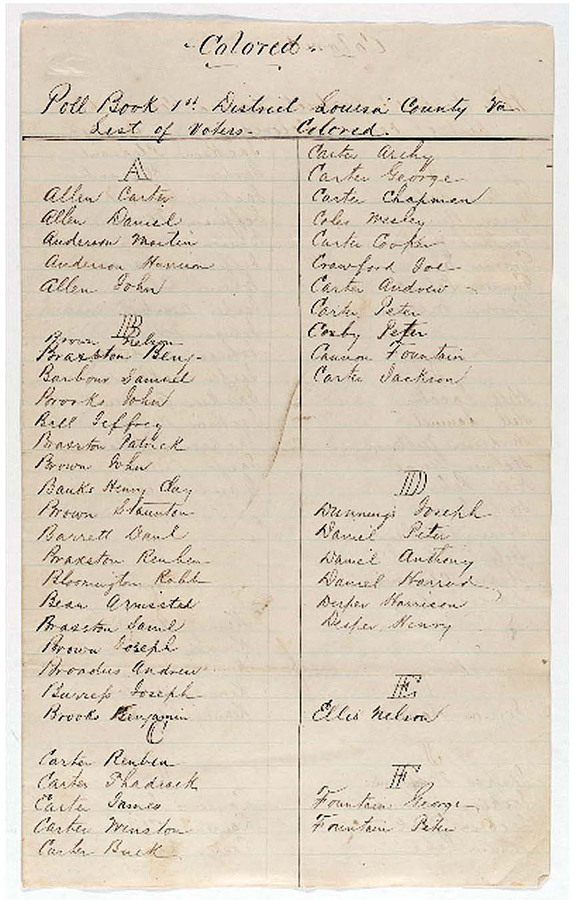2. Other Records Containing Names, 1862-1870
There are a few public records which document the presence of freedmen in Louisa County between 1865 and 1870. They are described below and indexes and transcriptions are included as available.
Personal Property Tax Records with Employer listed
One of the most valuable sets of documents is the Personal Property tax lists for the years 1865-1870. As soon as emancipation took effect, all men over 21 were included on the tax rolls and subject to the capitation tax. The rate was 28 cents in 1866 and increased to $1 in 1870. Residents (including women over 21) were also taxed on all of their personal property each year: horses and mules, cattle, hogs, tools, watches, household furniture, etc.Â
The most important information in the documents for genealogical purposes is that between 1867 and 1870 the records required that all freedmen report their employer or where they were living (in 1870 only the southern district records this information). There was significant movement across the area for work, but most freedmen stayed somewhat close to home, many continuing to work for their former enslavers or a neighbor.
The relationship to Employer, or the person on whose property they reside, not only helps establish the area of the county where freedmen lived, but is a potential indicator of where the person was enslaved. It can yield important finds to explore the employers family trees and see if estate records exist (see the Index of Wills and Estates) which name the enslaved people.Â
An effort has been made to compare and note where those named in the tax records are also named in a labor contract in the Freedmen’s Bureau Field Office files for Louisa County. You'll notice Freedmens records are indicated whereever either the freedman or their employer are named. Â
Link to Access the combined 1865-1870 Louisa County Personal Property Tax Records.
Note: Although the records contain all free persons over 21, only the records of non-white residents have been transcribed.  The images of the microfilmed records are available at the Library of Virginia and in the Louisa County Historical Society museum.
Freedmens Bureau Louisa Court House Field Office Files Index
The Bureau of Refugees, Freedmen and Abandoned Lands, or the Freedmen's Bureau, was formed in the aftermath of the war during the military occupation of Virginia to assist the newly emancipated slaves adjust to life as free persons. The files contain many circulars, or memos, directly policy as well as letters, complaints and labor contracts involving freedmen. Of particular note are the labor contracts. They needed to be approved by the local officer of the Bureau. Many use language that indicates a prior relationship of enslavement between the landowner and the freedmen such as, "you will obey me as in former times" or "will do the work as they did in former times."Â
A finding aid for these files was created several years ago by Kristin Hicks of the Louisa County Historical Society. She has extracted the names of freedmen, others, and the subject of each document in the collection. A reading of the finding aid gives a good sense of the kinds of issues facing freedmen and may include the name of someone you are researching. Several records are viewable in this archive by searching the term "freedmen". A two disk set of the image files on DVD are available in the Louisa County Historical Society for purchase or research.Â
Link to Access the Louisa Court House Field Office Finding AidÂ
Link to Access the Freedmens Bank records for people from Louisa or Goochland Counties
Louisa County 1862 Special War Tax Book
The cost of the war forced Virginia to impose a special war tax in 1862. A record was created from the Personal Property and Land Tax books to create a composite image of the holdings in land, slaves, and other property of all white residents in Louisa County. Â
It may be insightful to consult this list to learn about the people for whom freedmen are working after the war. What is the size of the property and how many enslaved persons were workinig there before emancipation? It is a good snapshot of the wealth of free residents near the start of the Civil War.
1862 was also a year when a large number of enslaved adults self-emancipated by escaping to nearby Union forces. Attached is the list of those people by name with owners now held at the Library of Virginia. Click on the first page of typed index to access a PDF containing both a transcribed list and original images.Â
Link to Access the composite index of the 1862 Special War Tax book
Link to Access the list of 1862 Runaways from Louisa County
Â
1867 Black Voter Register Rolls
These lists are compiled of all eligible black voters and organized by magisterial district, District 1 is Green Springs, District 2 is Louisa Court House, District 3 is Cuckoo, and District 4 is Jackson. These districts were divided by north/south lines from the top of the county to the bottom. Â
Link to Access the Vote registration lists



